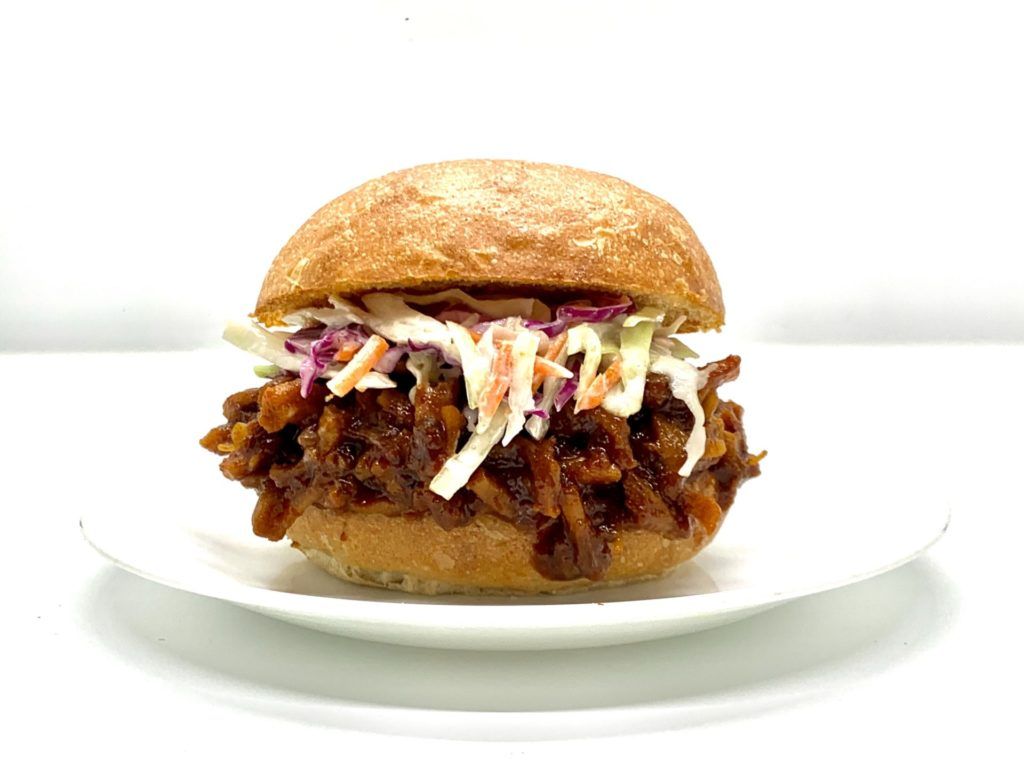Editor’s Note: To mark International Women’s Day this week, we’re publishing a series of Meet the Founder interviews with female founders we’ve never spoken to before. Here’s the first.
Like other founders of plant-based food startups, Kesha Stickland decided to start The Mushroom Meat Co. after changing her diet to address the ongoing health issues she and her family were battling.
A few prototypes and several R&D challenges later, the North Carolina-based company is nearing the official launch of its mushroom-based protein products that can be used to replicate various types of meat. The Mushroom Meat Co. was also recently accepted into Big Idea Ventures‘ latest cohort.
Startups making mushroom-based protein today tend to focus mainly on mycelium. Stickland, who has a decades-long background in software, chose instead to leverage the actual fruiting body of the plant and to manufacture a plant-based protein that’s entirely clean label. “We’re making it easy to eat plant-based without compromising taste, ingredients, or your impact on the planet,” she tells AFN.
Read on to learn more about how Stickland formed the company, the challenges she’s met along the way, and what’s next for The Mushroom Meat Co.
AFN: What was your initial motivation for starting an alt-protein company?
KS: Founding the company was something that came out of some personal changes that were motivated by a combination of health concerns that I had. I have an autoimmune condition called Hashimoto’s disease, which is already a challenge to manage and usually requires medication. I also had a really bad car accident that was complicating everything and I was trying to heal from it for a couple of years.
It wasn’t going very well, to say the least. I had head injuries, shoulder injuries, hip injuries, etc., and was in constant pain and willing to try anything. A friend of mine recommended going to a naturopath — a doctor that does healing primarily with food and herbs. She recommended switching to a plant-based [diet] and cutting out other things that were inflammatory to a lot of people with autoimmune conditions, like soy and gluten and heavily processed foods. That’s what I did and I lost 50 pounds.
I really [thought] helping people through a health-related business would be something that I could do. I’ve worked with people with everything from cancer and autoimmune conditions to people just trying to lose weight. What I found was that the hardest part of making this shift [to a plant-based diet] was food cravings. One of the things we crave the most is meat and after that cheese. And so I actually started making alternatives to meat out of everything and really became pretty obsessed with mushrooms. And then when you get into mushrooms you pretty much get into fermentation. I had this crazy idea one day to mix multiple different microbes with mushrooms and figure out how that would impact texture and other things. I came up with a couple of prototypes and people loved them.

AFN: How did you wind up choosing to use the actual mushroom over mycelium as protein?
KS: It took about two years. We spent about a year in R&D, really just trying to figure out whether to work with actual mycelium, which is like the roots of mushrooms. But I actually thought it was a more interesting challenge to work with the fruiting bodies, to work with the mushrooms that people know and love. We tried both and we actually preferred the flexibility of the mycelium at first. But it would cost a lot more in terms of scaling it. There’s a very big difference between growing mycelium when it’s just a little bit and when you’re growing mycelium as food. It’s also very easily contaminated. And so needless to say we ended up actually building a good amount of IP around the mushrooms themselves and are able to accomplish a bunch of different shapes and textures, everything from shreds to flakes.
AFN: Being clean label is also a big priority for your company, correct?
KS: Everything we do is allergen-friendly, free of soy, gluten, and clean label. You can liken our process to something more like cheese-making or soy sauce-making. When we looked on the market, we saw a lot of things that had great meat-like tastes and textures but very few clean and simple ingredients. So we decided to have that be our differentiator.
I’ve found that it’s probably a bigger challenge to create eating experiences without chemically modified ingredients, without food starch, without methylcellulose. And so we have a burger now that has solid fat that’s not technically animal fat, but behaves like animal fat: it gels when you cook it. And all of the ingredients are recognizable and not what you would ever expect to have in that kind of burger. To me that’s innovation.
AFN: Describe the technical process behind your proteins.
KS: All I can say is that we use microbes to enhance the properties of mushrooms and that they are natural, clean label, and they have been used in processing food for thousands of years. We actually have a patent pending on that.
AFN: What are a couple of challenges you have faced building the company?
KS: Lots of R&D challenges. We’re in the [Research Triangle][ around biotech, but not foodtech. So there are lab resources but for pharmaceutical or nutraceutical type businesses. It’s been very, very challenging to go down the foodtech path because there are no local food labs. We have one that we’re now talking to and probably going to use, but they’re literally three and a half hours. away. So we have to make commutes in order to do certain types of R&D.
The processing center is also a challenge. In a lot of cities like Los Angeles, San Francisco, New York you have a lot of resources for food tech startups where you might have a food lab that has the appropriate type of equipment along with a test kitchen. We didn’t have that and that’s, that’s slowed us down.
I think the other challenges really were around attracting funding. I’m not gonna say we’re past that at this point. But we’re in an accelerator program. We’ve taken our first investment and it was slow going because it seems like, with clean label, investors think “okay, there’s nothing interesting here, there’s no IP, there’s no differentiators.” So communicating and getting people to see the value was more challenging than I expected.
AFN: Are you focused primarily on B2B or B2C markets right now?
KS: We’re probably not going to go direct to retail. We’ve had really great responses from food service companies. We looked at retail and felt like it was somewhat limiting because there was a lot of expectation around coming up with what I kind of felt were like one-off products.
So I started to abstract out the reusable components, taking a lot of that model from software. We have this biomass, it can be unflavored. It can be shaped a bunch of different ways: shredded, chopped flaked, etc. It can be pulled pork, it could be tuna, it could be a bunch of different things. The biomass was one component, then we had flavors and fat replacers and then binders. We realized that supplying ingredients to other companies would allow us to probably even make a bigger impact than going directly to consumer retail.
By using you know mushrooms, we have a label advantage, we have a familiarity that consumers are going to have with what we’re offering and a lot less education we have to do. Right and the other thing that’s different is that it means that you know we can get to market sooner because we don’t have to set up the same sort of growing operation almost right now we have a network of mushroom farms. And we take a lot of the products and a lot of the parts and pieces that others don’t take, okay. Something that you know we can create at an affordable price, but even when we do and we do plan to do at least a portion of our own growing scaling, you know, mushroom growing in the kind of vertical farming type model is a lot easier and cheaper than scaling the growing of mycelium. So we have the advantage of getting to market faster, we have the advantage of you know, a lower cost scale. So those are some of the things I think are really about our model.





